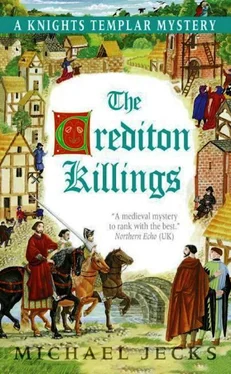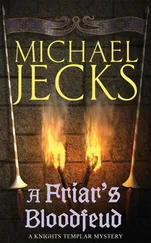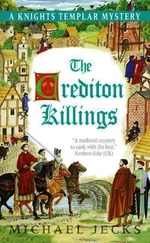Her ability to invent and add to her store of pleasant fantasies was one protection from the dullness of her toil, and now there was a possibility of the realization of her dreams. She glanced into Sir Hector’s eyes as she poured more ale. Catching her look, he subjected her to a serious study for a moment.
She was certainly comely, he thought. Her hair was rapidly coming loose from its moorings, lending her firm and youthful body a deliciously wanton look. Her eyes were bright and swift to smile, if not bold or experienced. He could not wish for a better companion for a couple of days, and when he saw her eyes fall and the blush rise to her neck and cheeks, he felt sure that her thoughts had turned the same way. Her response delighted him, and he turned away confident in the knowledge that his bed would be warm that night.
Henry had not yet returned to his seat, he saw, and a quick frown crossed his brow. The third man who had entered with the goldsmith was still by the doorway, staring at him.
This was no wealthy merchant or burgess. He stood clad in a simple tunic and short hose, both of a green turned pale by overuse. A russet cloak was draped over his shoulders, and a hood darkened his features. No sword hung from his belt, only a long knife. He appeared to be hesitating, and Sir Hector watched his indecision with amusement. He was sure it must be caused by the revelry in the hall; the newcomer must soon decide it would be better to leave and find another tavern.
To his surprise, the man started moving toward him, weaving through the throng of soldiers with casual self-confidence.
“Are you Sir Hector de Gorsone?”
The voice was more youthful than he had expected from such a broad-shouldered figure. “Yes, I am Sir Hector,” he replied.
Tossing back his head, the visitor let his hood fall. “I wish to join your band.”
For the second time that evening the hall fell silent. The knight found himself faced by a young man, no more than nineteen or twenty, with long wavy hair the color of unfired clay. His face was narrow and cleanshaven, with a high forehead and narrow nose which was marred by freckles. A thin mouth pointed to obstinacy of character, and the wide-set green eyes showed that he had a serious nature, not given to jokes.
“I have enough men already,” said Sir Hector dismissively.
“One more can always be of help at need.”
“Have you been trained to fight?”
“No, sir. But I am young and strong. You can teach me.”
“Why should I? There are others I could pick from.”
“I’m healthy and loyal. I want to go with your band and learn your ways. I am sick to death of farming. Let me come with you.”
Sir Hector opened his mouth to refuse the insolent puppy, but then allowed himself to reconsider. The young man was a tempting addition to the band. He was solidly built and looked capable of using his hands. There was a determined cast to his mouth, the captain saw, a look of resolution. He carried himself well, straight and tall, moving with an almost feline ease and sureness, and the breadth of his shoulders pointed to strength. He was still now, one hand resting on his dagger-hilt, the other on his purse. There was an aura of purpose and dignity about him which, as Sir Hector knew well, many abbots would do well to emulate.
Out of interest, he let his gaze wander over his men. They sat quietly, for the most part, watching their captain and waiting to see how he would react. One or two were grinning, obviously expecting him to issue a devastating rejection. The look irritated him. He had selected them all in similar ways: he had never felt the need to seek out new recruits – they accumulated round a successful captain as a matter of course. All the men in this room had come to him after hearing about his triumphs, just like this new one. Why should he throw him out when he had accepted them?
“You look brave enough,” he said at last, slowly. “It takes courage to enter a hall like this and ask a favor in front of men you know nothing about.” The stranger inclined his head in acknowledgment, a curiously cynical smile twisting his mouth.
“Come here.” Passing his mug to Sarra, the knight leaned forward and motioned the newcomer to his knees. When he knelt, Sir Hector took both his hands between his own. “Swear to be loyal to me and to take orders from me and no other.”
“I so swear.”
“Good. Henry? Take this man and show him how we are organized. See to his weapons.”
“Thank you, Sir Hector,” the youth said as he stood.
The knight raised a quizzical eyebrow. “Do not thank me yet. I can be a hard master, but if you show loyalty and are prepared to follow my commands, I will be good to you.”
Sarra watched as the stranger walked away with the man who had tried to attack her. He was a handsome lad, she thought. It was a shame that he was going to be indoctrinated by an evil oaf like Henry.
“So what’s your name?” Henry was intrigued by his new charge, who hardly glanced at him as he answered: “Philip Cole.”
Some echo in the name made Henry give a fleeting frown, but they were at their table, and Cole was maneuvering himself into a gap at the bench so he missed the brief grimace. Henry barged in to sit at Cole’s left, while to the young man’s right sat a rough-looking rat-faced fellow with hair as black as a crow’s feathers. His amber eyes roved restlessly around the room as if looking for someone more interesting to talk to, and the candles and sconces reflected in them. To Cole they looked alive with devious, glittering intelligence. Together with the blackened teeth in a slack and dribbling mouth, he possessed an air which gave Cole a feeling of revulsion. His frame was whip-thin and wiry but there was strength and cruelty in the long fingers that tore at the chicken before him.
Henry introduced him. “This is John Smithson. He’s like me, one of the old men of the band.”
“That’s right. We were two of the first to join Sir Hector.”
“That was back in 1309. In Gascony.”
Cole accepted a pot from a passing waitress. “So you must have fought in many battles?” he asked, carefully keeping his tone level.
John smiled. “Yes, all over. For one master and then for another.”
“It’s a good life,” Henry sighed, taking a huge draft of ale and belching. “Others are told to join an army and fight, but we can go where we want and fight for whoever we want. We are more free than any burgess or farmer.”
“Yes – and we can make more money from it,” said John slyly.
His friend laughed. “Aye, and keep it!”
“What do you mean?” asked Cole.
“Just this,” Henry said, leaning toward him. “In a lord’s army, if you were called up to fight, you would be there because of your master and fighting for him. Any money you won would be his; any hostages you wanted to ransom would be his – you would have no rights. With us, we fight for ourselves. If we win a prize, we keep it. Any spoils go to the winner, and the devil with the losers.”
“They rarely live anyway,” said John casually as he bit into a haunch of chicken.
Henry noticed Cole’s expression. “Don’t worry, Sir Hector is a good master. He doesn’t lose, and has few men hurt under him. He’s more likely to change sides when the wind blows sour than stay and be hacked to death. There’s no profit in winning a coffin.”
Cole held his tongue, but nodded as if eased.
Turning to his food, Henry hid a smile. Philip Cole had the typical look of a peasant, one of unfocused goodwill, with bovine slowness of thought and general dullness. Laughing, Henry slapped the recruit on the back. “No need for the long face! You’ll soon find yourself rich enough to be happy.” Henry had open, friendly features which had deceived more experienced men than Cole, and the thick shock of sandy hair made him look much younger than the scars and wrinkles promised; his age was only given away by his strength. Though his arms were short, ending with stubby little fingers, they held enough power to make Cole think, when he was thumped genially over the shoulders, that he had been buffeted by a benign but clumsy giant. “Don’t worry – if Sir Hector isn’t there, John and me’ll look after you, won’t we, John?”
Читать дальше












